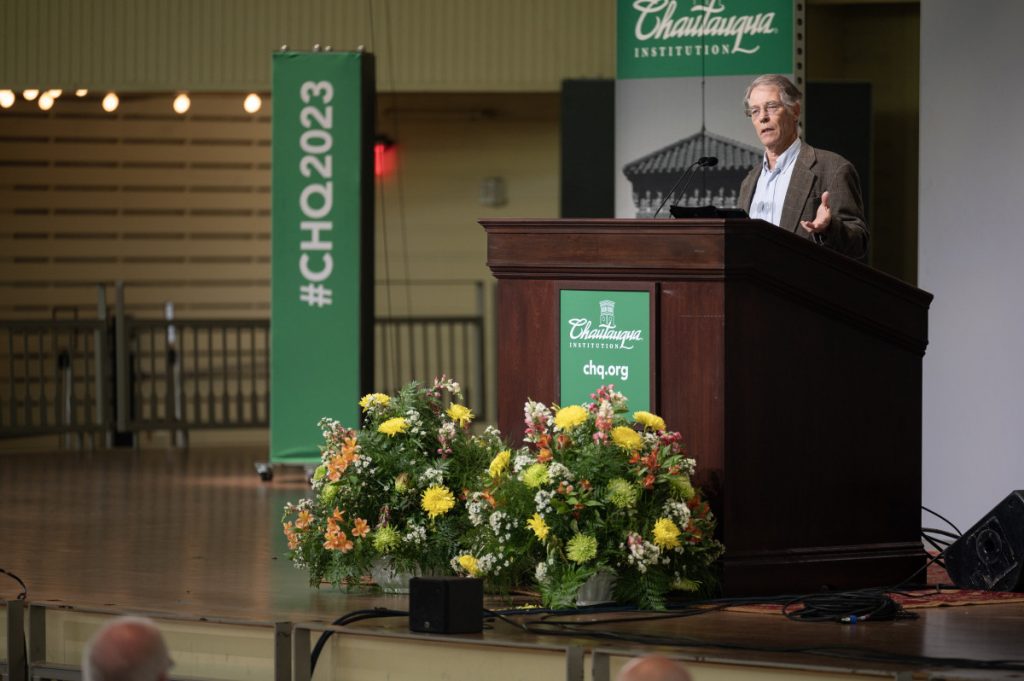
Alton Northup
Staff writer
Kim Stanley Robinson has lived 10,000 lives.
He has been a young girl in Naples, Italy, a captain in the Napoleonic Wars, and how can he forget the time he served on Henry VIII’s court?
“You are constantly trying as you read to imagine the other,” he said. “We need to be imagining the other.”
Robinson, author of more than 20 science fiction books, discussed the novel’s ability to transport readers to other lives and its role in the climate crisis at 10:45 a.m. Friday in the Amphitheater to close the Chautauqua Lecture Series Week Six theme, “A Life of Literature.” Robinson’s latest novel, The Ministry for the Future, is a 2023 Chautauqua Literary and Scientific Circle selection, and the lecture was held in conjunction with the CLSC.
Novels are driven by two elements, Robinson said. They are anthropological by giving access to other times and culture, but they also need something to go wrong.
“The tension of plot is simulated by our natural interest with things going wrong in ordinary life,” he said. “That’s the novel.”
Detective novels are straight to the point with this, Robinson said. Within the first few pages, readers know a crime has been committed and that the detective will solve it. Readers following along with the detective start to think about why the suspect committed the crime.
“Reading novels gives us telepathy,” Robinson said. They allow readers to fill the shoes of someone different than themselves, in a time different than their own and informed by a culture distinct from theirs.
“You have to conclude that ultimately, we’re all the same, and we’re all completely unique,” he said.
This conclusion gives rise to the novel’s power to create meaning, he said.
At its core, a novel is an author saying: “This happened; people are like this.” A reader does not have to take the author’s word as truth, but they can compare the experience with the other 9,999 books they have read and form their own.
However, Robinson has his work cut out for him as a science fiction writer.
“Literature is crucial … to making our sense of reality itself,” he said. “A story set in the future, you have to think, ‘Oh wait, what’s it doing?’ ”
He asked readers to think of science fiction as an old pair of 3D glasses.
On one side, science fiction is a prophecy for what is coming. On the other side, science fiction acts as a metaphor for how life feels. Together, the two sides create a new dimension.
This new dimension is the fourth dimension of time.
“Science fiction is historical literature done in reverse,” Robinson said. “You see that we’re going to be the past of some future civilization, and they will be judging us.”
He broke down the genre into three parts: Near future science fiction, the next 10 years; far future science fiction, a fantasy story millions of years from now; and future history, the time between the other genres.
Many of Robinson’s novels fall under the future history genre, often called climate fiction, including The Ministry for the Future. The novel starts in 2025, and follows an international organization established under the Paris Agreement that advocates for the world’s future generations.
When writing, he asks himself what humanity might do to address current problems, 100 years from now. Robinson said he became a climate fiction writer as a response to reality itself, and uses his novels to find out how humanity can create a better world.
“We are crashing our biosphere,” he said. “Literature that can take this on has an advantage.”
Robinson further separates science fiction into dystopia and utopia. Dystopia is the crash, and utopia is the plan.
“It’s not kind of hard to imagine a society working better than this one,” he said. “It’s hard to imagine getting there.”
If the world can get through the 21st century without a mass extinction event or collapse of society, he calls that a utopia. The plan is already in action on all fronts to make this outcome a reality.
Since the pandemic exposed the impact an event in one country has on the other, Robinson said countries are aware a solution has to work for all 8 billion people on Earth if it is going to work for just one. Climate treaties such as the Paris Agreement and the Montreal Protocol are only promises, but show countries are willing to come together, he said.
“That best-case scenario of us cludging through and blundering through the next few decades and actually getting to that place — there’s an intense hunger for that story,” he said.




